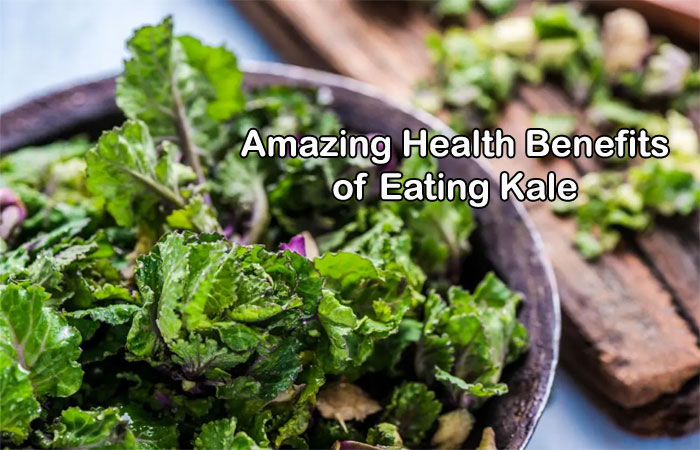Kale belongs to the superfood category due to its plethora of health benefits. Though kale vegetable has many imperative compounds and some robust medicinal properties, it is the most underrated vegetable. This nutritious plant food is very tasty and you can incorporate it into your diet in many ways.
What is Kale?
Kale is a cruciferous vegetable that belongs to the family of cabbage, broccoli, cauliflower, collard greens and Brussels sprouts. Different types of kale are available in the market. The kale leaves can be either green or purple and have either a smooth or twisted shape.The most popular type of kale is curly kale or Scots kale. This type of kale has a fibrous stem and green and wavy leaves.
Nutrition Value of Kale
A cup of raw kale (67 grams) contains,- Calories: 33
- Carbohydrate: 6 g
- Protein: 3 g
- Vitamin A: 206% of the DV (from beta-carotene)
- Vitamin K: 684% of the DV
- Vitamin C: 134% of the DV
- Vitamin B6: 9% of the DV
- Manganese: 26% of the DV
- Calcium: 9% of the DV
- Copper: 10% of the DV
- Potassium: 9% of the DV
- Magnesium: 6% of the DV
- Kale contains 3% or more of the DV for Vitamin B1 (thiamin), Vitamin B2 (riboflavin), Vitamin B3 (niacin), iron and phosphorus
The aforementioned kale nutrition facts suggest how beneficial kale is for your health.
10 Amazing Health Benefits of Kale
Let’s consider some of the kale benefits for your health as mentioned below:-- Boasted with Powerful Antioxidants: Kale is richer in antioxidants like beta-carotene, vitamin C, flavonoids, and polyphenols. Antioxidants prevent oxidative damage by free radicals in the body. Oxidative damage is the prime cause of aging and many other diseases, including cancer. Kale also contains a higher amount of flavonoids quercetin and kaempferol. These substances protect your heart, minimize your blood pressure, and have properties like anticancer and anti-depressants.
- Astonishing Source of Vitamin C: This water-soluble vitamin controls many pivotal functions of your body like collagen synthesis and many more. Kale contains a higher amount of vitamin C as compared to other vegetables like spinach, orange, etc.
- Minimizes the Levels of Cholesterol: Components like bile acid sequestrants may bind bile acids in the digestive system and prevent them from getting reabsorbed by your body. This minimizes the total amount of cholesterol in the body. Kale is blessed with bile acid sequestrants that can minimize the levels of cholesterol. This also minimizes the risk of heart disease over time. A medical study has claimed that drinking kale juice every day for 12 weeks increased HDL (the “good”) cholesterol by 27% and lowered LDL levels by 10%.
- Possess Cancer-Fighting Components: Kale is flooded with many compounds that are effective against cancer. Sulforaphane in Kale is beneficial in fighting the formation of cancer at the molecular level. Kale also contains indole-3-carbinol which prevents cancer. Medical studies have revealed that cruciferous vegetables like Kale may strikingly reduce the risk of several cancers. But more comprehensive studies are required to establish the claim.
- Safeguards Your Eyes: Kale contains antioxidants like lutein and zeaxanthin that will prevent your eyesight from getting worse. Many studies have proved that people who consume adequate lutein and zeaxanthin have a lower risk of macular degeneration and cataracts.
- Supports Weight Loss: Kale is a weight-loss-friendly food and offers fewer calories. Due to its low calorie and high water content, kale has a low energy density. If you eat low energy density foods, they will support your weight loss journey. Kale possesses small amounts of protein and fiber. These two are the prime components for weight loss.
- Kale Benefits for Skin: Since kale contains vitamins like C, E, and K, hence it makes your skin healthier and younger. Vitamin C is an antioxidant that brightens the complexion of your skin and also, helps to overcome fine lines and free radicals.
- Improves Your Digestion: Kale improves your digestion and eliminates toxins from your body. Don’t abandon the stems as they are the powerful sources of prebiotics that you are required for your gut bacteria. You can sauté kale with avocado or olive oil and make some delicious breakfast recipes.
- Promotes Healthy Liver: Kale contains higher amounts of fiber and sulfur. Both these components are helpful in the natural detoxification process and keep your liver wholesome. Kale is also effective in removing pollutants from the bloodstream.
- Good for Your Bones: Kale offers more calcium than milk. Calcium plays an imperative role in maintaining bones. This mineral also performs a plethora of body processes such as cell signaling, nerve functioning and supporting blood vessels transporting blood through the body.
Side Effects of Eating Kale
Here are a few side effects of kale for your reference:- Dizziness
- Itchy Skin
- Bloating
- Oral Distress
- Hives


